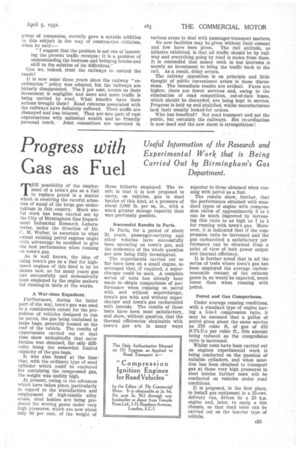Progress with Gas as Fuel
Page 53

If you've noticed an error in this article please click here to report it so we can fix it.
Useful Injormation of the Research and Experimental Work that is Being Carried Out by Birmingham's Gas Department.
THE possibility of the employment of a town's gas as a fuel to replace petrol is a matter which is receiving the careful attention of many of the large gas undertakings in this country. Much useful work has been carried out by the City of Birmingham Gas Department Industrial Research Laboratories, under the direction of Dr. C. M. Walter, to ascertain to what extent existing petrol engines might with advantage be modified to give 1 he best performance when running on town's gas.
As is well known, the idea of using town's gas as a fuel for highspeed engines of this kind is by no means new, as for many years gas has successfully and economically been employed by the engine makers for running-in 'units at the works.
A War-time Expedient.
Furthermore, during the latter part of the war, town's gas was used to a considerable extent for the propulsion of vehicles designed to run on petrol, the gas being contained in large bags, generally housed on the roof of the vehicle. The results of experiments carried out at that time show undoubtedly that satisfaction was obtained, the only difficulty being the somewhat limited capacity of the gas bags.
It was also found at the time that, with the ordinary type of steel cylinder which could be employed for containing the compressed gas, the weight was unduly high.
At present, owing to the advances which have taken place, particularly in regard to the manufacture and employment of high-tensile alloy steels, steel bottles are being produced for storing gases under very high pressures, which are now about only 60 per cent, of the weight of those hitherto employed. The result is that it is now proposed to carry, on vehicles, gas in steel bottles of this kind, at a pressure of about 3,000 lb. per sq. in., with a much greater storage capacity than was previously possible.
Successful Results In Paris.
In Paris, for a period of about 2.i years, passenger-carrying and other vehicles have successfully been operating on town's gas, and the economics of the whole question are now being fully investigated.
The experiments carried out so far have been on a small engine, so arranged that, if required, a supercharger could be used. A complete series of tests has already been made to obtain comparisons of performance when running on petrol with and without supercharger, town's gas with and without supercharger and town's gas carburetted with benzole. The results of these tests have been most satisfactory, and show, without question, that the thermal efficiencies obtainable with town's gas are in many ways superior to those obtained when running with petrol as a fuel.
The results show, further, that the performance obtained with standard types of engine with compression ratios of approximately 5 to 1 can be much improved by increasing this ratio to as high as 7 to 1 for running with town's gas. Moreover, it is indicated that if the compression ratio be increased and the gas carburetted a satisfactory per formance can be obtained from a point of view of both power output and thermal efficiency.
It is further noted that in all the series of tests where town's gas has been employed the average carbonmonoxide content of the exhaust gases is, as would be expected, much lower than when running with petrol.
Petrol and Gas Comparisons.
Under average running conditions, with a standard type of engine having a 5-4o-1 compression ratio, it may be assumed that a gallon of petrol gives about the same service as 270 cubic ft. of gas of 475 B.Th.lis per cubic ft., this amount being reduced as the compreAsion ratio is increased.
Whilst tests have been carried out on engines experimental work is being conducted on the question of suitable cylinders, and when sanction has been obtained to transport gas at these very high pressures in steel bottles further tests will be conducted on vehicles under road conditions.
It is proposed, in the first place, to install gas equipment in a 25-cwt. delivery van, driven by a 20 h.p. engine and, later, to equip a bus chassis, so that road tests can be carried out on the heavier type of vehicle.












































































































